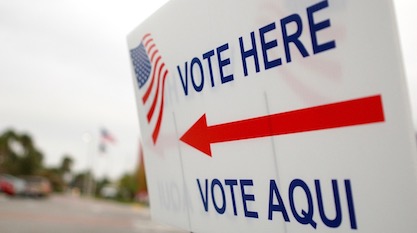 Neuroscience & Mind
Neuroscience & Mind
Scott Adams and Rule by Algorithms


Now having voted in the U.S. midterm elections — our state votes by mail only — we get to sit back and see what happens. As ever, editorial staff at Evolution News take no view on the preferred outcome. Over at Mind Matters, Denyse O’Leary analyzes comments by Dilbert cartoonist turned armchair political philosopher Scott Adams, worrying about the coming of rule by algorithms. I’ve been a fan of Adams since my wife turned me on to his nerdy charm. It’s fascinating to see him in interaction with interviewer Ben Shapiro, a very different personality.
“The Last Human President”
If the current U.S. President, like him or hate him, is potentially the last human holder of that office, as Adams argues, that could make today’s election the last human election, couldn’t it? Denyse isn’t sure about that conclusion, but it is provocative. An extract from her transcription:
Scott Adams: “I’ve actually worried that Trump might be the last human president and I mean that literally, in the sense that the algorithms and the social media companies will be able to control the thoughts and the feelings and the attitudes, and even the social policy preferences of the public to such a degree that the politicians will just have to do whatever the public is saying. It’s pretty hard to be a president and do something that 70% of the public doesn’t want you to do. It’s very unusual. So the presidents will be captive to the public. As they are, except the public will not be independently thinking and they won’t be led by the presidents and vice-versa.
“I think the algorithms will decide what the public thinks and then the public will tell the president what to do and the president is going to have to do it or get a new job. So it’s possible that even the — because of the complexity of the algorithms, you know, it’s not something that, one person sits down and says, okay, here’s my little equation, I’ll tweak this one, I know how to change it. It’s not only that, it’s complicated. It’s a lot of different inputs. In all likelihood, there is no human being at any of these companies, no single human, who understands how the algorithm works. And that means humans aren’t in charge anymore. It means the algorithm is going to do what it is going to do. And we can maybe say, if you change this variable I’m pretty sure something will happen at this end. But it is not a one-variable situation. There are many variables. It’s sort of like climate change; modeling it is insanely hard. So I think that complexity will mask the fact that the algorithms will start running the show with a little bit of correction from humans.”
Ben Shapiro: “So you’re suggesting that we may be a lot less skeptical of social media than we even ought to be even those of us on the right who have been skeptical of the left-leaning bias of places like Facebook and YouTube?”
Scott Adams: “You can be as skeptical as you like; it’s too late. There is nothing that can happen that would stop what I have just described.”
Boom. He doesn’t mean there won’t be humans in the Oval Office in the future, but that the power behind the power will be AI. Is it true? O’Leary comments: “As a news writer, I am not sure I follow Adams’s argument. Media and viewers are a feedback loop. If Fox News disappeared, Schlox News would start up within a month. Fox did not create those viewers; it found them and persuaded them to stay.”
The Human Quality
Increasingly, though, one of the standout qualities of many prominent political candidates is a robotic aspect, where the humans appear to be speaking what complicated formulas — algorithms — told them that voters wanted them to say. If I understand him correctly, Adams thinks that as the formulas grow more complex and impervious to human understanding, and at the same time more persuasive to voters and to candidates, it will be the algorithms that rule.
The reason I’m skeptical has to do with human exceptionalism. The human quality in a candidate will always shine through, for better or worse. Irrepressibly, humans will respond to that. It’s not replaceable by a formula. It is the foolish, and probably the losing, political candidate who fails to understand that and trusts with a perfect faith in the almighty algorithm.
Photo credit: Erik (HASH) Hersman, via Flickr (cropped).
